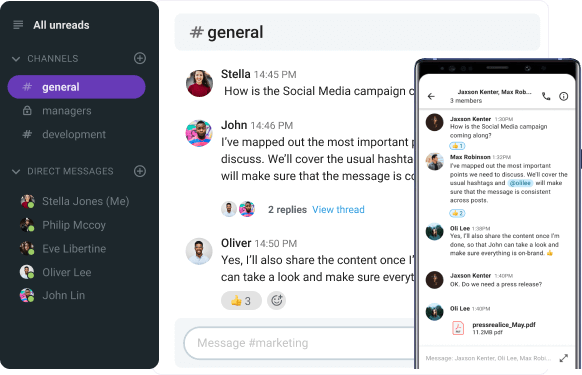Have you ever been in a situation where you wanted to say ‘No’ to something but couldn’t do it?
Did you ever refuse to help your colleague with something at work and were labeled as “difficult to work with” or “not a true team player”?
Have you ever lied to avoid doing something you simply didn’t want to or weren’t interested in?
If you answered yes to some of these questions, you might be having trouble with saying no politely at work.
Perhaps the situations mentioned above don’t seem that problematic to you, but we shouldn’t underestimate the power and importance of saying ‘No’ at work:
- We have to know why it is important to say ‘No’ to our boss, to our teammates, to our employees, and to our clients.
- We also have to know the implications of NOT saying ‘No’ at work.
- Finally, we have to know how to say ‘No’ professionally — how to protect our time, beliefs, and long-term goals while not offending the other side in the process.
We will learn to do it all after thoroughly reading this blog post (hopefully, once we get to the end of this, I’ll learn a thing or two about politely saying ‘No’ at work, too).
Let’s begin!
Table of Contents
Why is it important to say ‘No’ at work?
Before we go deeper into the topic, I think it’s paramount that we understand the importance of saying ‘No’ in a professional setting.
And when I say this, I don’t refer to declining offers without even considering them first or denying help to those who need it. I’m referring to the situations in which you have to:
- Choose to protect your time over other people’s time.
- Find the courage to stay true to your decisions despite the influence of others.
- Consciously choose to put your values and beliefs first.
Creating meaningful workplace relationships, building trust, and maintaining respectful communication in the workplace is only possible if everyone is considerate enough to respect other people’s boundaries and wishes, right?
I find it essential to know when to reject your boss, your teammate, your employee, or your client for the sake of better workplace communication and collaboration.
Let’s see how we can do that.
Why is it important to say ‘No’ to your boss? 🧑💼
Research has shown that employees who love their jobs are more likely to experience burnout at work.
Moreover, employers usually recognize the passion in their employees and easily take advantage of their engagement. This means that you will make the cut when your boss needs someone to do some unpaid work after office hours.
But, if your long-term idea is to keep doing your job in a company you hold dear, you should learn when it is okay to say ‘No’ to your boss.
These situations include the following:
- You don’t have the time: Taking on more work when you’re already swamped will pave the way to exhaustion, frustration, and ultimately resentment. Plus, you’re more likely to make mistakes.
- You’re overqualified/underqualified: Doing something that’s not aligned with your skills and knowledge can hurt not just your professional reputation but also the entire organization.
- The task is illegal: Engaging in illegal activities just because your boss asked you to isn’t a smart move. If something goes wrong, you’re the most likely to take the fall — affecting both your career and the entire company.
- The task goes against your beliefs and values: Doing things that you would otherwise label as unethical or inappropriate just for the sake of pleasing your boss can affect your relationship.
Rejecting your boss might be the hardest and most intimidating thing you’ll ever do in your career, especially if you are devoted to your job and the company you work for.
But, once you set your priorities straight, you’ll understand that saying ‘Yes’ to everything your manager or team lead asks doesn’t bring good to anyone in the long run.
Why is it important to say ‘No’ to your teammate? 🧑💻 👩💻
Helping a colleague out is a good thing only when it doesn’t affect your work and when both sides are completely okay with it.
If you refuse to do what a coworker asked you to do, it might make you feel uncomfortable. But if you accept even though you don’t want to do it, you might regret it later.
While being a team player is important in any team, you should know when to say ‘No’ for the sake of better communication and collaboration.
It’s okay to say ‘No’ to a colleague when:
- You don’t have the time: Refusing to help a colleague out when you don’t have the time is much better than putting a strain on your relationship and doing a poor job.
- You don’t know how to do it: Doing something you’re not skilled at just because your teammate needs help can affect your professional reputation and build resentment among you.
- You’re not interested: It’s better to turn down an offer from a coworker than to do a lousy job because it doesn’t interest you at all and you want to get it over with.
Learning how to say ‘No’ without offending your team members will help you set boundaries and safeguard your workplace relationships in the long run.
Why is it important to say ‘No’ to your employees? 🧑💻
It’s important to be supportive of your employees and encourage them to share ideas. But where should you draw the line?
If your goal is to create a positive work environment, you have to normalize reasonable and argument-supported no-saying.
Giving everyone a say in important decisions is desirable, but keeping your long-term goals in mind should remain your top priority.
Here’s when you should prioritize saying ‘No’ to your employees:
- The employee is underqualified/overqualified for the task: It’s your job to pick the right people for the right tasks. It will boost productivity, generate better outcomes, and increase the chances of success.
- You are protecting the organization’s long-term goals: Allowing everyone to share their ideas is okay but you should always have your company’s long-term goals in mind when deciding what to reject.
- The employee has an unreasonable/unlawful request: You should avoid accepting to do something that goes against your beliefs or something illegal — it will protect both your reputation and the reputation of your organization.
- It makes you a better boss: If you know that an employee would benefit from your no, you should discourage them from doing it politely and without making them feel incompetent.
As a strong leader, you’ll spend a lot of time telling ‘No’ to your employees. If you learn to do it gracefully and carefully, you’ll be on the road to eliminating the fear of rejection in the workplace.
💡 Pumble Pro Tip
Leaders have to always work on their communication skills and try to be better than they were yesterday. If you think your leadership approach needs some fine-tuning, we have you covered:
Why is it important to say ‘No’ to your clients? 🙍♀️🙍♂️
Perhaps the trickiest ‘No’ of all is the one you have to tell your clients.
Since they are the ones financing you, you would hate to disrupt the harmonious relationship with your third-party associate and stay out of business.
But, you can, and you absolutely should keep your stance in front of your clients, even if that means rejecting their request or proposal.
You should consider telling ‘No’ to your client:
- When you don’t know how to do what they are asking you to do: It’s better to admit you don’t know how to do something than accept your client’s offer and fail to deliver the desired results.
- If money is the issue: If what your client asks of you goes beyond your budget, it might be a better choice to decline. Bankrupting your company just because you wanted to please a client isn’t the wisest move, don’t you agree?
- When it interferes with your other clients: if you’re working with several clients and only one is causing you headaches, you absolutely should put your foot down.
- If they’re asking you to do something unlawful: Engaging in forbidden or criminal activities to satisfy a client could be the ruin of both of you if you get caught.
- You have too much on your plate: Accepting more work when you don’t have the time can put a strain on your relationship and ultimately do the opposite of what you initially wanted.
Usually, your clients are the source of your financial stability. But, if tending to that stability means fulfilling unreasonable requests and affecting your business, it might be time to reconsider your approach to third-party communication.
What happens if you never say ‘No’ in the workplace?
No one likes being labeled a “people-pleaser”, but the truth is that many of us have been called this at least once.
Yet, Debra Wheatman, career expert and the president at Careers Done Write tells us what happens if we never say ‘No’ in the workplace:

“The inability to say ‘No’ may cause resentment, especially if you are then going to be overwhelmed and unable to meet your commitments. This will also cause a significant imbalance in your time.
Saying ‘No’ allows control over the work you have and will enable you to be more effective on behalf of the company and with your time.”
So to paint Wheatman’s words even clearer, let’s see why always saying ‘Yes’ is bad:
- It makes you start resenting your boss, coworkers, employees, and/or clients.
- It makes you feel like you have disappointed or offended your boss/teammate/employee/client.
- It drains you both mentally and physically.
- It takes up too much of your time and energy.
- It makes you less focused, less productive, and less happy with your workplace.
- It makes you put your goals and objectives second and forget your priorities.
- It affects your overall work and life quality.
Let’s see what you can and should do to be more comfortable and more successful when saying ‘No’ to the people you work with.
An example of what happens when you never say ‘No’ at work
When asked about this topic, one of our regular contributors, Bill Catlette, partner at Contented Cow Partners shared his personal experience. Let’s see what we can learn from Bill:

“About three months into my first role as an HR professional, I was struck one day by the feeling that I was drowning professionally. I was working my tail off from dawn to dark, desk piled high, and with each passing day, the “To-Do List” got longer while it seemed that very few things were getting crossed off.
A rather direct chat with my boss made clear the fact that I wasn’t the only one who noticed the floundering.
At one point, he asked me what my professional priorities were, and I completely whiffed. He then showed me something that is a hallmark of every good leader.
He took responsibility for his share of the ownership of that little problem and then told me the unvarnished truth about how this was all going to end if he and I didn’t get our stuff together.
What I discovered was that, by having no clear priorities, and being a nice guy who accepted onto his plate of responsibilities anything and everything that everyone else didn’t want to do, I had put a millstone around my neck and jumped into the deep end of the pool.
From that moment forward (and it has been a long journey), I’ve taken pains to know at all times what my top three priorities are, and to regularly share that list with those around me.
I’ve also learned to be certain that I have a similar understanding of the priorities of my reporting senior because if mine and hers (or his) aren’t in sync, we need to know it and fix it.”
9 Tips for saying ‘No’ politely at work
With the help of these 9 tips, you can significantly reduce the yes-saying in your workplace and strive for a more balanced work environment in which saying ‘No’ isn’t a sign of betrayal or attack.
Tip #1: Evaluate the situation and context
According to a group of authors behind the research paper named The power of saying ‘No’, saying ‘No’ is a critical skill for your career development and building strong professional relationships.
They argue that “a terse or thoughtless answer can put off colleagues or mentors, and even burn bridges.”
They also advise that you take your time to evaluate the request and the wider context before making your final decision. Some of the strategies the authors advise us to employ include:
- Deciding if a request or an opportunity is aligned with your beliefs, fits into your long‐term goals, or supports your career development.
- Listening to verbal communication.
- Paying attention to non‐verbal communication.
- Acknowledging the request, the information, or the opportunity.
- Identifying any issues with what’s expected and expressing compassion in saying ‘No’.
- Looking for support or advice from your peers before saying ‘No’, particularly if the thought of saying no is stress‐ or anxiety‐producing.
- Giving a viable alternative or justifying your definitive ‘No’.
- Being ready to recommend someone else.
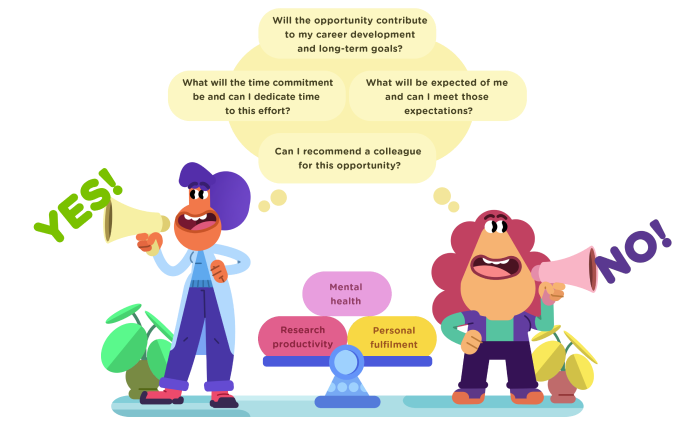
The key takeaway from this research and a great piece of advice to follow: Evaluating the situation and the context before saying ‘No’ is important for demonstrating maturity and willingness to help others.
Tip #2: Be straightforward and to the point
If you have to or want to say ‘No’, don’t beat around the bush. Being clear and transparent is essential for turning down a request or a proposal.
Why?
Because you don’t want to keep the other side waiting or stand in the way of a time-pressing matter. Even if you have to decline someone over an email or an instant message, you want to do it as politely and as clearly as possible.
Just watch out. There’s a thin line between being clear and being rude.
Let me showcase how a few polite words can make even a refusal sound nice. 👇
🔸 Example: How to be straightforward and to the point
Christina asks Michael to look at the report he’s been working on by sending him an instant message in Pumble, a business messaging app.
After explaining clearly that he already has a lot of work to do, Michael refuses to help Christina. But he does so politely and considerately, wishing her luck in finding someone else to help him out.
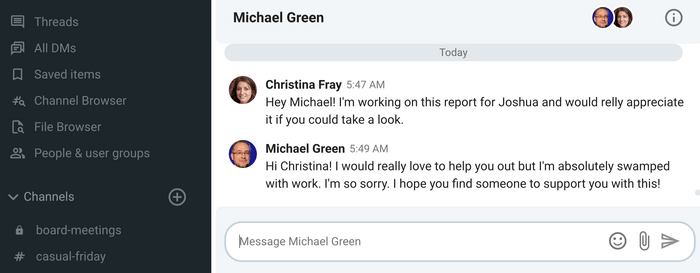
💡 Pumble Pro Tip
If you’re eager to know how Pumble can help you and your team communicate and collaborate better, take a look at its offer and pricing here:
Tip #3: Explain yourself briefly
If you want to avoid sounding rude and inconsiderate, taking the time to explain your decisions and choices is the right way to go. Not being honest about the real reason behind your ‘No’ can affect the relationship with your boss/teammate/employee/client.
Even if the other person doesn’t like your response, an honest explanation will help them understand better your perspective and make their peace with it.
Two things I would suggest you steer clear in any situation are white lies and over-explaining. Neither can help you achieve your goals but both can get you into trouble and cause miscommunication between you and the other person.
The example below might help you keep your explanations brief and polite.
🔸 Example: How to explain yourself briefly
Mark asks Claire to help him open a document. He sends her the document via Pumble, a business messaging app. Willing to help, Claire responds quickly. She explains that she is in a meeting and can’t do anything at the moment.
But to show genuine interest in Mark’s problem, Claire says she would contact him once her meeting is over, making her ‘No’ sound less harsh.
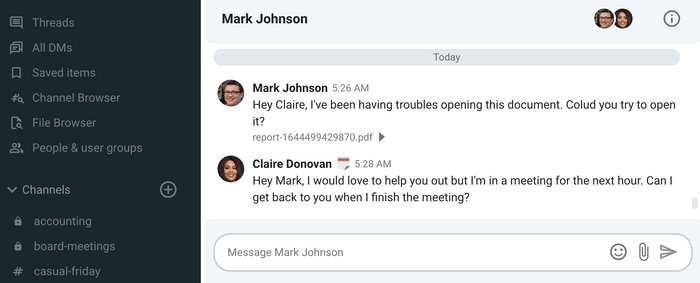
Tip #4: Embody kindness and respect in communication
According to the Businessolver’s 2021 State of Workplace Empathy Study, over 90% of CEOs, HRs, and employees have emphasized the importance of empathy in the workplace every year since 2017.
This information alone is enough to make you realize how important it is to keep your workplace communication respectful and be kind to those you work with every day.
By approaching the whole situation with kindness and respect, you’ll show your client or your employee that you take a genuine interest in their problem and avoid offending them.
Empathetic workplaces are based on trust and understanding. Once you achieve that, saying ‘No’ to things you can’t or won’t do won’t be considered as an act of offense but an act of maturity and critical thinking.
Take a look at the example below to see that it’s possible to reject someone and still be respectful.
🔸 Example: How to embody kindness and respect in communication
Jackie has to find a replacement for the Women in Tech Conference organized next month. She decides to send an instant message to Christina in Pumble, a team messaging app, and see if she would take her place.
Being booked for the entire next month, Christina knows she has to turn the offer down. Despite that, she asks for the context and tells Jackie about her schedule, apologizing along the way.
By showing keen interest in Jackie’s issues and taking the time to explain the reasons behind her ‘No’, Christina maintains respectful workplace communication and keeps an open door for future requests or offers.
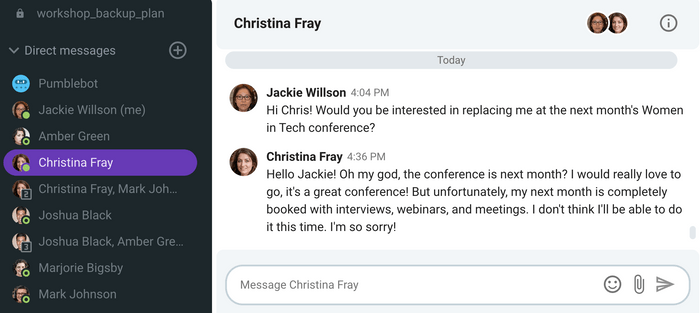
Tip #5: Stay confident about your decision
If you decided to say ‘No’ to an offer or a request, you should keep your stance no matter what. If you allow yourself to break under the influence of others, you might appear insecure, accommodating, and unreliable.
If you have to turn down your boss or a colleague you’re fond of, the situation becomes even harder. But you have to remind yourself that saying ‘No’ to them doesn’t mean you’re unhelpful or disrespectful. It means that:
- You have your priorities straight.
- You don’t want to compromise your work or time.
- You know your limitations.
- You don’t want to lead someone on.
- You think the other person will benefit from your final ‘No’.
The example below shows how this works in reality.
🔸 Example: How to stay confident about your decision
Sabrina is eager to go to the escape room event with her teammate Jenifer. However, Jennifer had already refused to go. Sabrina sends a DM via Pumble to Jennifer hoping to change her mind.
Despite Sabrina’s insistence on going, Jennifer keeps her stance about her decision. She turns down the offer once again, wishing Sabrina a fun time.
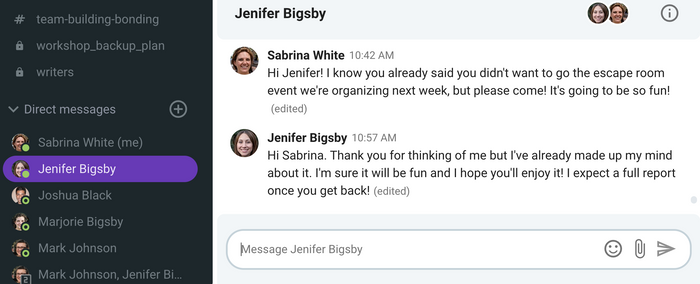
Tip #6: Provide an alternative
Do you know what happens in the brain of the person you say ‘No’ to?
Neuroscience claims that the human brain is hardwired to respond to a ‘No’ more intensely, more quickly, and more persistently than to a ‘Yes’.
According to a social psychologist and an expert on willpower, self-control, and self-esteem, Roy F. Baumeister, Ph.D., the human brain reacts extremely painfully to negative stimuli.
To put it in simple English, when you say ‘No’ to your boss, your employee, your coworker, or your client, their brain automatically interprets it as a negative event.
Why is this important?
Because providing an alternative can help your ‘No’ be less stressful and painful — both for you and the party.
Let’s explain how to do this through a business communication example.
🔸 Example: How to provide an alternative
By sending her a text message in Pumble, Derek invites Georgina to join a webinar he is preparing for next week.
Knowing she will be on the road at the time of the webinar, Georgina gracefully declines Derek’s invitation and gives him an alternative — she suggests that he invites two other colleagues to the webinar.
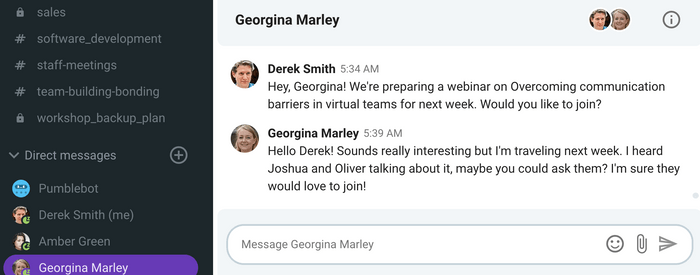
Tip #7: Learn to establish boundaries
Another essential thing to consider when saying ‘No’ are boundaries.
Poor boundaries at work feed a vicious cycle — one you can find hard to get out of.
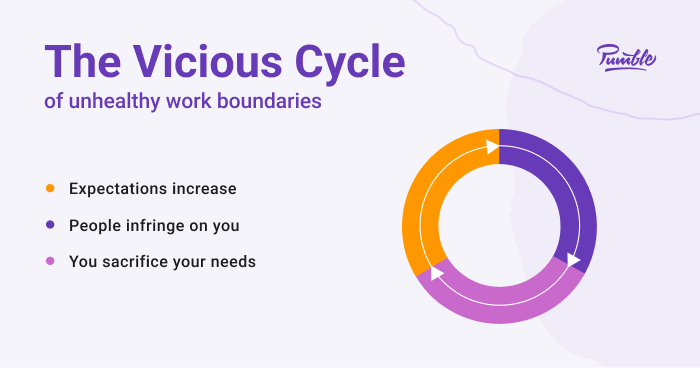
To help you understand why you should have clear boundaries at work and in life, let’s take a look at what poor boundaries do to you.
Poor boundaries can:
- Make you more responsive to other people’s expectations and needs.
- Push you into sacrificing your own expectations and needs.
- Make you lose control over your time, work, and outcomes.
- Increase other people’s expectations from you — they get used to you being at their disposal no matter what.
Creating reasonable boundaries with the people around you early on is essential. People will be less inclined to approach you with unreasonable requests and proposals and you won’t have to reject them as often.
💡 Pumble Pro Tip
Standing up for yourself at work should be part of your long-term agenda. Setting work-life boundaries isn’t easy, but it’s vital. We have a text that can help you achieve that:
Tip #8: Stick to your priorities
According to Catlette, it’s paramount to stick to your priorities in situations where you’re deciding whether to say ‘Yes’ or ‘No’.
He advises:

“Sticking to your priorities means that you will regularly need to tell people “No, I can’t (or won’t) do that.” There’s no need to be hard-hearted about it or put yourself on a guilt trip.
Saying no when asked is actually doing them the favor of not disappointing them later, when you’ve acceded to their request and can’t deliver.
It also doesn’t make you unhelpful, as it’s entirely possible to tell someone, “No, I can’t do that, but let’s see if we can find someone who can help you.”
I think you’ll find that by leveling with people on the front end, they will come to trust (and actually like) you better by virtue of the respect you’ve accorded them and yourself both.
Try it.”
Tip #9: Develop and follow your gut feeling
In his The Art of Saying No TedTalk, Kenny Nguyen, CEO and Co-founder at ThreeSixtyEight, spoke about using the power of ‘No’ to grow.
Although we grow up to associate the word ‘No’ with rejection and denial, we realize later on in life that our parents were acting as our conscience, preventing us from getting a stomachache by eating more candy.
We also learn that it’s not important to know how to say ‘No’, but also when and why to say it. This paves the way for better opportunities in the long-term, Nguyen explains.
After a life-changing experience that affected his entrepreneurial career, Nguyen realized that following his gut feeling in yes-no situations is necessary for making the right decision.
He uses a sword and shield analogy to explain this further:
“No is a protective shield in compliments to the swords of yes.”
In other words, whether you use your swords of yes to overcome obstacles or use your protective shield of no to protect yourself boils down to developing your gut feeling, argues Nguyen.
How do you do that?
By turning down big opportunities in the short term for even bigger opportunities in the long term, Nguyen concludes.
The bottom line here would be something like this:
When we say no to something, we might be closing one door. But we’re also opening another door for bigger opportunities and making room for personal growth and progress, both for the other person and ourselves.
40 Useful phrases for saying ‘No’ at work
In addition to the tips you got to read here, you should take the time to learn what phrases work well for turning someone down graciously.
You can pick your favorite phrase from a list of 40 phrases we’ve listed here. We dived them into 4 groups based on their purpose:
- Useful phrases for declining an offer or invitation,
- Useful phrases for declining due to lack of time,
- Useful phrases for declining when you’re not interested, and
- Useful phrases for declining with no specific reason.
💡 Pumble Pro Tip
If you want to learn more useful phrases that work well in professional settings, take a look at our three texts to find out more:
10 Useful phrases for declining an offer or invite
You can use some of these phrases when you want to decline an offer or an invite from the people you work with:
- I truly appreciate your offer/invite, but I can’t make it this time.
- I am flattered that you considered me, but I’ll have to pass this time.
- It sounds interesting, but I’ll have to take a raincheck.
- I’m honored by your proposal, but I can’t take on more work at the moment.
- Unfortunately, I won’t be able to do it.
- I truly appreciate the offer/invite, but I can’t fit it into my calendar.
- Thank you for thinking of me, but I won’t be able to help you.
- You’re so kind to think of me, but I can’t be of assistance this time.
- Thanks, but perhaps some other time.
- Sounds great, but I can’t commit to another thing.
15 Useful phrases for declining due to lack of time
Saying ‘No’ when you don’t have the time can be tricky, but with the phrases we’ve listed here, you can make it work:
- I can’t make it today/this week/month/year.
- I’m sorry, I’ve got too much on my plate right now.
- Unfortunately, I’ll have to take a raincheck.
- I’m just swamped right now, so I won’t be able to help you.
- I have a few things I need to take care of first. Can I let you know later?
- I’m really focused on my priorities right now, so I can’t help you at this time.
- I’m completely maxed out.
- I’m really spread thin lately, I just can’t make this work at the moment.
- I simply can’t take on more projects right now.
- I’m booked into something else.
- I’m not taking on new tasks or projects.
- Another time might work for me.
- I really don’t have any free slots in my schedule.
- Thank you but I’ve already committed to something else.
- Regrettably, I have something else scheduled.
5 Useful phrases for declining when you’re not interested
Doing things that don’t interest you will most likely make you resent the person or even start avoiding making contact with them.
To make sure that doesn’t happen, try some of the following phrases the next time you tell them ‘No’:
- It doesn’t sound like something I would do now.
- I’m not sure I’m the best fit for that.
- I believe I wouldn’t fit the bill, I’m sorry.
- I’m sorry, It’s not a good idea for me.
- I don’t think I’m the right person for that task/project.
10 Useful phrases for declining with no specific reason
You don’t have to have a specific reason to turn someone down, but you have to know how to do it politely and avoid offending them. Consider the following openings:
- I wish I could make it work. I’m sorry.
- Apologies. Maybe we can try this another time?
- Sorry, I can’t make this work now. Let’s find someone else to help you with that.
- I wish I could help you with that.
- Unfortunately, I can’t help you with that now. Why don’t you ask…?
- I’d rather not get involved in another project at the moment.
- Unfortunately, it’s not a good time.
- I’d rather not get involved.
- I have something else planned for today. I’m sorry.
- I’m sorry, but I don’t think I’ll make it.
Stand up for yourself on Pumble and say ‘No’
To make things work to our advantage in this world, we have to show everyone that we know what we are doing through courage, willpower, and excellent decision making.
If that calls for rejecting a few offers from time to time for the sake of the greater good, we should be ready to pay that price.
When saying ‘No’ at work, we have to carefully pick the right medium (as well as our words). With Pumble, a team communication app, you’ll have plenty of opportunities to decline offers and task — and communicate your reasons for doing so — since it offers:
- Direct messaging, for quick, real-time or asynchronous communication,
- Private and public channels, where you can inform entire groups or teams that you’re unable to pick up a task, allowing them to then organize themselves more quickly and efficiently,
- Voice messages, that allow you to explain your reasons for refusal in a more natural way, and
- Audio and video calls, for when the occasion calls for a face-to-face conversation.
Pumble makes everything easy — even saying ‘No’ at work.

